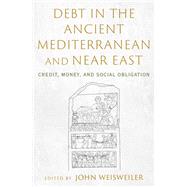Debt in the Ancient Mediterranean and Near East Credit, Money, and Social Obligation
, by Weisweiler, John- ISBN: 9780197647172 | 0197647170
- Cover: Hardcover
- Copyright: 11/1/2022
In his Debt: The First 5000 Years, the anthropologist David Graeber put forward a new grand narrative of world history. From the Late Bronze Age onwards, all across the Near East and Mediterranean, relationships of mutual obligation were transformed into quantifiable and legally enforceable debts. Graeber suggests that this transformation made possible new economic institutions, such as IOUs, coinage, and chattel slavery. It also led to the emergence of modes of thought that have shaped Eurasian philosophical and religious traditions ever since.
Debt in the Ancient Mediterranean and the Near East explores the implications of this theory for the history of the Mediterranean and Near East. A distinguished group of ancient historians assesses how well Graeber's interpretations fit current understandings of ancient and late antique economies. At the same time, this volume offers a history of premodern credit systems which takes seriously the dual nature of debt as both quantifiable economic reality and immeasurable social obligation. By exploring the diverse ways in which social relationships were quantified in different ancient and late antique societies, the work introduces a method of writing the history of premodern systems of exchange that departs from the currently dominant paradigm of neo-institutional economics.
Debt in the Ancient Mediterranean and the Near East explores the implications of this theory for the history of the Mediterranean and Near East. A distinguished group of ancient historians assesses how well Graeber's interpretations fit current understandings of ancient and late antique economies. At the same time, this volume offers a history of premodern credit systems which takes seriously the dual nature of debt as both quantifiable economic reality and immeasurable social obligation. By exploring the diverse ways in which social relationships were quantified in different ancient and late antique societies, the work introduces a method of writing the history of premodern systems of exchange that departs from the currently dominant paradigm of neo-institutional economics.






